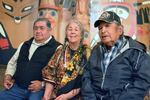
Wilbur Slockish, Carol Logan, and Johnny Jackson say their tribes can no longer practice religious ceremonies at a site near Mount Hood because it was destroyed in an effort to expand Highway 26.
The Becket Fund for Religious Liberty
Attorneys for several Northwest tribal elders argued in federal court in Portland on Monday that the destruction of a spiritual site along Highway 26 near Oregon's Mount Hood nearly a decade ago violated their religious freedoms.
Members of the Confederated Tribes and Bands of the Yakama Nation, as well as the Confederated Tribes of Grand Ronde, say they can no longer practice religious ceremonies at the site because it no longer exists. They're asking a federal judge to rule that the government violated the Religious Freedom Restoration Act.
The plaintiffs are being represented by Becket, a Washington, D.C.-based firm that says it defends "the free exercise of all faiths."
The firm was behind the Supreme Court's 2014 landmark Hobby Lobby case that allowed closely-held for-profit companies to claim religious exemptions.
Court filings show that Becket got involved in the Oregon case in 2012. But the case dates back to 2008, when the Oregon Department of Transportation expanded part of Highway 26 onto land owned by the federal government.

Carol Logan, Wilbur Slockish and Johnny Jackson stand on the edge of a cliff at Enola Hill, a sacred Native American site near Mount Hood.
The Becket Fund for Religious Liberty
During the expansion, burial grounds and a stone altar were destroyed, and old-growth trees were cut down. The tribal elders argue the area was a place of worship.
Today the site — about 13 miles west of Government Camp — is a grass-covered berm. But it was once "the place of big, big trees," said plaintiff Carol Logan, an elder with the Confederated Tribes of Grand Ronde. Logan spoke after Monday's hearing before U.S. District Court Magistrate Judge Youlee Yim You.

The graphic from the plaintiff's court filings shows Highway 26 before it was expanded as well as the sacred worship area and stone alter.
U.S. District Court filings
The tribal elders are asking You to find the government violated the Religious Freedom Restoration Act by "substantially burdening" their religious exercise.

The graphic, from the plaintiffs, shows Highway 26 after the expansion. The trees and stone alter were removed.
U.S. District Court filings.
"Of course the destruction of a Native American sacred site imposes a substantial burden because it makes religious exercise at that site impossible," wrote Luke Goodrich, deputy general counsel with Becket, in an August court filing.
But attorneys for the federal government say the RFRA doesn't apply.
Reuben Schifman, an attorney arguing the case for the U.S. Department of Justice, said that's because the tribal members weren't required to choose between following their religious convictions and receiving a benefit from the government, as the law states. Nor were the tribal members being forced to choose between their religious beliefs and civil or criminal sanctions, he wrote.
During oral arguments Monday, Schifman also said the tribal members didn't engage with the public process during the highway expansion, making it difficult for the government to understand the significance of the site.
But Stephanie Barclay, an attorney who delivered oral arguments on behalf of the tribes, said the tribal members stopped attending meetings in the 1990s because they were threatened.
"The idea that the government didn't know about the religious rights in this case is absolutely a fiction not supported by the law," Barclay said following Monday's hearing.
Even if the judge finds the federal government violated the Religious Freedom Restoration Act, any real responsibility falls to the Oregon Department of Transportation, not the federal government, the DOJ's Schifman wrote in court filings.
"A further overarching problem with Plaintiffs’ legal theory is that the actual conduct Plaintiffs object to — the construction of the turn lane — was not done by Federal Defendants, but rather by ODOT," Schifman wrote.
But Goodrich, one of the tribal elders' attorneys, rejected that idea.
In court filings, he wrote the government is trying to "pass the buck arguing that it merely authorized the Oregon Department of Transportation to destroy the site, rather than wielding the chainsaws and bulldozers themselves."
Goodrich said several court filings have found the Religious Freedom Restoration Act "applies to 'a federal governmental decision about what to do with federal land.'”
"The sacred site here was on federal land and subject to federal control," Goodrich wrote. "So the destruction never could have taken place unless the Government had authorized it. And the Government did far more than that — it planned, guided, coordinated, funded, and profited from the destruction."
Related: At Lyle Falls, Tribal Fishermen Carry On A Longstanding Tradition
For 45 years, Logan said, she visited the altar to worship, pray and honor her ancestors.
"It was was there that I attained a higher knowledge and connection with our creator," she said Monday. "But nine years ago, I wept as I saw the government destroy everything that is sacred to us."
The trees were "the walls of worship, but they cut them to pieces," Logan said. "They destroyed our burial grounds. This is where our ancestors rest, and yet they ripped the soil apart like a open wound."
You didn't say Monday when she would issue her ruling.
